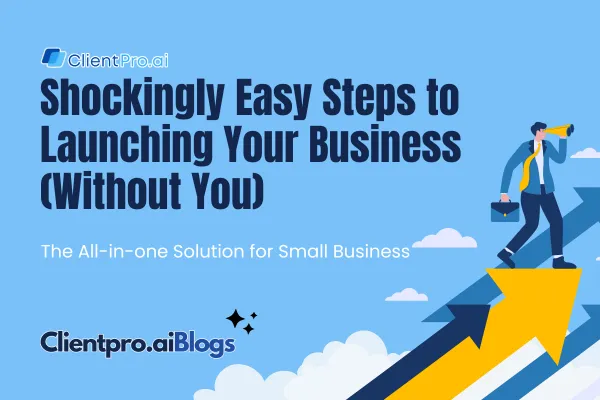Client Pro Blogs
Get Unlimited Leads With 'AI'
Download Our Free Ebook

Effortlessly Launch Your Online Business with Our Done-For-You Setup
Effortlessly Launch Your Online Business with Our Done-For-You Setup
Are you ready to take the leap into the world of online entrepreneurship but feeling overwhelmed by the technicalities of setting up your business? Look no further!
Our Done-For-You Setup service is here to make your journey smooth and hassle-free. With our expert team handling everything from website creation to payment gateways, you can focus on what truly matters - growing your business. Say goodbye to hours of research and tria l-and-error, and say hello to a professionally set up online store that is ready to start generating revenue from day one.
Whether you're a seasoned entrepreneur looking to expand your online presence or a newbie taking your first steps into e-commerce, our tailored solutions cater to businesses of all sizes. Let us handle the nitty-gritty details while you concentrate on your vision. Get ready to effortlessly launch your online business with confidence and ease!
Pre-Launch Phase
In the pre-launch phase of a product or service, it is crucial to build anticipation through effective marketing strategies. This phase sets the stage for a successful launch and can significantly impact the overall success of the product. Here are some key points to discuss:.
Building Anticipation through Marketing: Creating a buzz around the upcoming launch is essential to generate interest and excitement among potential customers. This can be achieved through teaser campaigns, sneak peeks, and exclusive previews. By strategically revealing bits of information, you can pique curiosity and create a sense of anticipation.
Utilizing Social Media: Social media platforms offer a powerful tool for reaching a wide audience and building a community around your brand. Leveraging platforms like Facebook, Instagram, Twitter, and LinkedIn can help you engage with your target market, share updates about the upcoming launch, and create a sense of belonging among followers. Encouraging user-generated content and interactions can further amplify the buzz and anticipation.
Advertising: In addition to organic marketing efforts, investing in targeted advertising can help amplify your message and reach a larger audience. Whether through online ads, influencer partnerships, or traditional media channels, a well-planned advertising strategy can increase visibility and drive interest in the pre-launch phase.
Creating Exclusive Pre-Launch Events: Hosting exclusive events or webinars for a select group of individuals can create a sense of exclusivity and generate buzz around your upcoming product or service. These events can offer a sneak peek into what's to come, allowing attendees to feel special and privileged, thus increasing their anticipation and interest.
Collaborating with Influencers: Partnering with influencers in your industry or niche can help expand your reach and credibility. Influencers have dedicated followers who trust their recommendations, making them valuable assets in building anticipation for your launch. By engaging influencers in teaser campaigns or exclusive content reveals, you can leverage their influence to create a wider buzz.
Implementing Email Marketing Campaigns: Email marketing remains a powerful tool in building anticipation and nurturing leads. Sending out targeted and personalized emails with sneak peeks, countdowns, and exclusive offers can keep your audience engaged and excited leading up to the launch. By segmenting your email list and tailoring content to different audience segments, you can maximize the impact of your email campaigns.
By focusing on building anticipation through marketing, utilizing social media effectively, incorporating advertising strategies, creating exclusive pre-launch events, collaborating with influencers, and implementing email marketing campaigns, you can set the stage for a successful product launch and create momentum that carries through to the post-launch phase.
Market Research and Planning
Market research is a critical foundation for any successful business strategy. It involves the systematic gathering, recording, and analyzing of data related to the market, consumers, and competitors. By conducting thorough online market research, businesses can gain valuable insights into consumer behavior, preferences, and emerging trends. This data serves as a compass, guiding businesses in making informed decisions that align with market demands and opportunities.
Defining the Target Audience
Defining the target audience is a pivotal aspect of market planning. Businesses need to delve deep into understanding the demographics, psychographics, and buying behaviors of their target market segments. By creating detailed buyer personas, businesses can tailor their products or services to address specific needs and pain points effectively. This targeted approach not only enhances customer satisfaction but also boosts brand loyalty and advocacy.
Competitor Analysis
In addition to understanding the target audience, competitor analysis plays a crucial role in shaping a company's competitive strategy. By evaluating competitors' strengths, weaknesses, and market positioning, businesses can identify gaps in the market that they can leverage. Furthermore, analyzing competitor strategies provides valuable insights into industry best practices and potential threats that may impact business performance.
Iterative Processes
Moreover, market research and planning are iterative processes that require continuous monitoring and adaptation. Businesses must stay agile and responsive to changing market dynamics, consumer preferences, and competitive landscapes. By leveraging tools such as surveys, focus groups, and social media analytics, companies can stay ahead of market trends and proactively adjust their strategies to maintain a competitive edge.
Data Analytics and AI
Expanding on the importance of market research, businesses can also utilize data analytics and artificial intelligence to enhance their understanding of consumer behavior. These technologies enable companies to analyze vast amounts of data quickly and accurately, uncovering valuable insights that can drive strategic decision-making. By harnessing the power of data-driven insights, businesses can personalize their marketing efforts, improve customer engagement, and optimize their product offerings to meet evolving market demands.
Social Media Platforms
Furthermore, in today's digital age, social media platforms have become invaluable tools for conducting market research. Businesses can leverage social listening tools to monitor online conversations, track brand sentiment, and identify emerging trends in real-time. By actively engaging with customers on social media, companies can gather direct feedback, address customer concerns promptly, and build a loyal online community.
Website Development and Design
When it comes to website development and design, the process involves more than just choosing the right website builder and hiring developers. It's about creating a digital presence that reflects your brand identity, engages your audience, and drives business growth.
Choosing the right website builder is indeed crucial. However, beyond the technical aspects, it's essential to focus on creating a user-friendly interface, optimizing for mobile responsiveness, and incorporating SEO best practices to ensure your website ranks well on search engines.
In addition to hiring developers, consider working with a web design agency that offers a holistic approach to website development. These agencies often have expertise in user experience (UX) design, information architecture, and content strategy, which are vital for creating a compelling online experience.
Furthermore, when developing a website, it's important to conduct thorough market research to understand your target audience's preferences and behavior. By incorporating elements that resonate with your audience, such as personalized content and intuitive navigation, you can enhance user engagement and drive conversions.
Moreover, ongoing website maintenance and optimization are key to ensuring your site remains relevant and competitive in the ever-evolving digital landscape. Regularly updating content, monitoring performance metrics, and implementing security measures are essential practices to keep your website running smoothly.
Successful website development and design require a strategic approach that combines technical expertise, creative design, and a deep understanding of your target market. By investing in the right tools, talent, and strategies, you can create a website that not only meets your business objectives but also delivers a memorable online experience for your visitors.
Importance of User Experience
Expanding on the importance of user experience, it's crucial to prioritize accessibility in website design. Ensuring that your website is accessible to all users, including those with disabilities, not only broadens your audience reach but also aligns with ethical and legal standards. Implementing features like alt text for images, keyboard navigation options, and clear headings can significantly improve the overall user experience.
Additionally, the visual appeal of a website plays a significant role in capturing and retaining visitors' attention. Utilizing high-quality images, consistent branding elements, and engaging multimedia content can enhance the aesthetic appeal of your site and leave a lasting impression on visitors.
Content Strategy
When it comes to content strategy, focusing on creating valuable, relevant, and engaging content is paramount. Incorporating a mix of text, visuals, and interactive elements can help keep visitors engaged and encourage them to explore further. Moreover, regularly updating your content to reflect industry trends and audience interests can position your website as a reliable source of information.
Leveraging Analytics
Lastly, leveraging analytics tools to track user behavior, monitor website performance, and gather insights can provide valuable data to inform future optimizations and enhancements. By analyzing metrics such as bounce rate, time on page, and conversion rates, you can make data-driven decisions to improve the overall effectiveness of your website.
In essence, successful website development and design require a multifaceted approach that considers not only technical aspects but also user experience, visual appeal, content strategy, and data-driven optimizations. By prioritizing these elements and continuously refining your website based on feedback and analytics, you can create a digital platform that resonates with your audience and drives tangible business results.
Launching Your Online Business
Are you ready to take the plunge into the world of online entrepreneurship? Launching an online business can be an exciting and rewarding venture, but it requires careful planning and execution. In this section, we will discuss a step-by-step guide to help you launch your online business successfully.
Define Your Business Idea: The first step in launching your online business is to clearly define your business idea. What products or services will you offer? Who is your target audience? What makes your business unique?.
Create a Business Plan: A well-thought-out business plan is essential for the success of any business. Outline your business goals, target market, competition, marketing strategy, and financial projections.
Choose the Right E-commerce Platform: Selecting the right e-commerce platform is crucial for your online business. Consider factors such as ease of use, customization options, payment gateways, and scalability.
Build Your Online Store: Once you have chosen an e-commerce platform, it's time to build your online store. Design a user-friendly website that reflects your brand identity and showcases your products or services effectively.
Develop a Marketing Strategy: To attract customers to your online business, you need a solid marketing strategy. Utilize social media, content marketing, email campaigns, and search engine optimization to drive traffic to your website.
Provide Excellent Customer Service: Excellent customer service is key to building a loyal customer base. Respond promptly to customer inquiries, address any issues or concerns, and strive to exceed customer expectations.
Utilizing Online Marketplaces and Websites
In addition to launching your own online store, consider utilizing online marketplaces and websites to reach a wider audience and increase sales.
Sell on Established Platforms: Platforms like Amazon, eBay, and Etsy provide a ready-made customer base for your products. Create seller accounts on these platforms and leverage their traffic to boost your sales.
Use Social Media and Online Advertising: Social media platforms like Facebook, Instagram, and Pinterest offer powerful advertising tools to promote your products to a targeted audience. Invest in paid advertising to increase visibility and drive sales.
Collaborate with Influencers: Partnering with influencers in your niche can help you reach a larger audience and build credibility for your brand. Identify influencers who align with your brand values and collaborate on sponsored content or product reviews.
By following this step-by-step guide and leveraging online marketplaces and websites, you can successfully launch and grow your online business. Good luck on your entrepreneurial journey!
Conclusion
Launching your online business can be a daunting task, but with the Done-For-You Setup service offered by ClientPro AI at. ClientPro AI DFY Setup , the process becomes seamless and efficient.
This service provides agency owners and aspiring entrepreneurs with expert guidance and a comprehensive solution to kickstart their online ventures. By taking advantage of features such as ClientPro AI Setup, Review Automation, and AI Follow-Up, users can save time and resources while focusing on their strengths.
For new customers, this service is a valuable investment in your business's success. Book a free strategy call today and experience the convenience of a hassle-free lead generation system. Don't miss out on this opportunity to elevate your online business with ClientPro AI's Done-For-You Setup service.
Let’s get you growing. Without the growing pains.
Let’s get you growing. Without the growing pains.
Contact Us
Easily Integrates With Leading Apps





About Client Pro
Culture
Compare Client Pro
Customer stories
Products
Features
All features
Appointments
Automation
CRM
Ecommerce & payments
Email marketing
Integrations
Landing pages & forms
Lead management
Reporting & analytics
Sales pipeline
Text marketing
Resources
Events
What is a CRM?
Lifecycle Automation
LCA Assessment
Free email templates
Subject Line Generator
How-to guides
Blog
Partners
Find a partner!
Apps & integrations
Help & Support
New customer resources
Customer Support
Help center!
Training Academy
Client Pro Marketplace
Play & template library!
Culture
Compare ClientPro
Customer stories
Contact us
Features
All features
Appointments
Automation
CRM
Email marketing
Text marketing
Sales Pipeline
Integrations
Payments & Invoicing
Websties & Landing pages
Lead management
Reporting & analytics
Products
Basic
Pro
AI Agent
Resources
Events
Automation
Free email templates
How-to guides
Blog
Help & Support
Customer Support
Help center
Client Pro Training Academy
Marketplace
Data migration
Coaching & guarantee
Product updates
Partners
Become a partner
Partner portal
Apps & integrations




